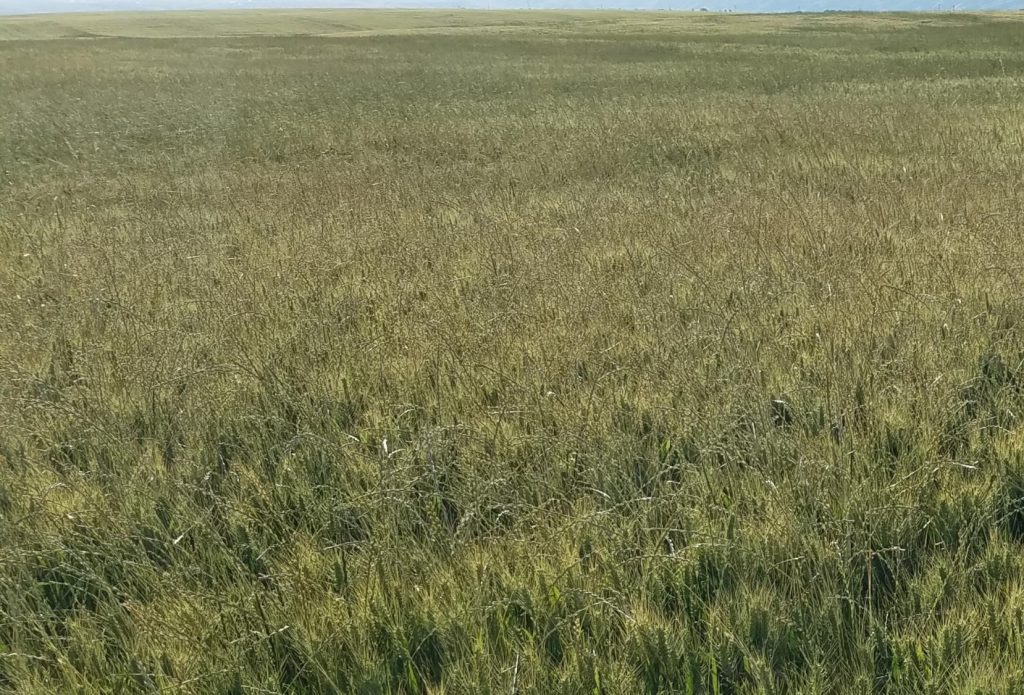While there are many uncertainties in farming in the dryland PNW, there is one thing we can always count on: weeds. Weeds are the bane of every farmer’s field, no matter the crop. But here is a modest proposal to dryland weed management issues: let fields rest for a year.
Hear me out. Just add an extra crop cycle to each field before its next obliged contribution to the pocketbook of the owner operator, landlord, or bank. The long-term benefit in weed control and improved soil quality could make up the difference in lost production over time. Here’s how it works: every so often, select fields could take a vacation, get a good rest, and maybe have a little self-improvement time. You know, get some lime, manure or gypsum, and try something new like a wacky rotation crop that does little but improve soil quality and break up weed, disease and pest pressures. They could clean themselves up a bit, get their field edges spot sprayed and other weedy “hot spots” attended to. These fields would greatly benefit from lowered expectations and would return to work less stressed and more resilient to face nature’s challenges – and our demands. They could be better community members as well, shedding fewer weeds to their neighbors if properly pedicured during their sabbatical.
I know what you’re thinking: there just is not time for that, at least not for most fields. The bank needs its check and so does the landlord. Crop insurance has improved but arguably remains a constraint on innovative management. An owner-operator has to keep the lights on and pay personnel. Maximizing short-term profits and leveraging economies of scale have been logical solutions for producers trying to keep their heads above water. This commonly translates to a wheat dominant or wheat-exclusive rotation scheme with fewer workers farming more acres more quickly. There is not much time (or labor) available to attend to the little details.

Figure 1. This field needs a vacation.
Unfortunately, this system makes good weed management extremely challenging. Nature is exceptionally good at taking advantage of repetitive activity – including short crop rotations. The increasing number of herbicide resistant weeds and incidences of herbicide resistance within weed biotypes across the region is proof positive of this. Unfortunately, the cycle largely continues because we feel we cannot afford to change it. My concern is that right now, combines, drills and sprayers are logging more highway miles than ever. They may also be inadvertently transporting and spreading herbicide resistant weed seeds. We all know the incentive to properly clean machines between fields is challenged by the need to get more done in less time. Solutions such as multi-year crop rotations that allow herbicide MOA rotation and combination, in conjunction with good sanitation practices at every step, are seemingly incompatible with the realities of modern farming.
The industry is doing back flips trying to figure out how to keep the current crop rotation and continue controlling weeds with the tools we have available – under the constraint of farming more acres in less time. This isn’t sustainable and it’s not smart practice. Perhaps it’s time to acknowledge that the inflexible nature of our crop rotations is part of the problem, and it is the current system of valuation and expectation surrounding this cropping system that needs adjusting. What if more farm programs and land leases included expectations of periodic rotation away from the norm and supported more comprehensive, targeted weed control activities and soil amendments or other beneficial management practices as a price of doing business? Imagine if the government, banks, and landlords saw (and were willing to invest in) the benefits of a periodic vacation from the status quo. The positive impact on both weed control and land quality could be significant.